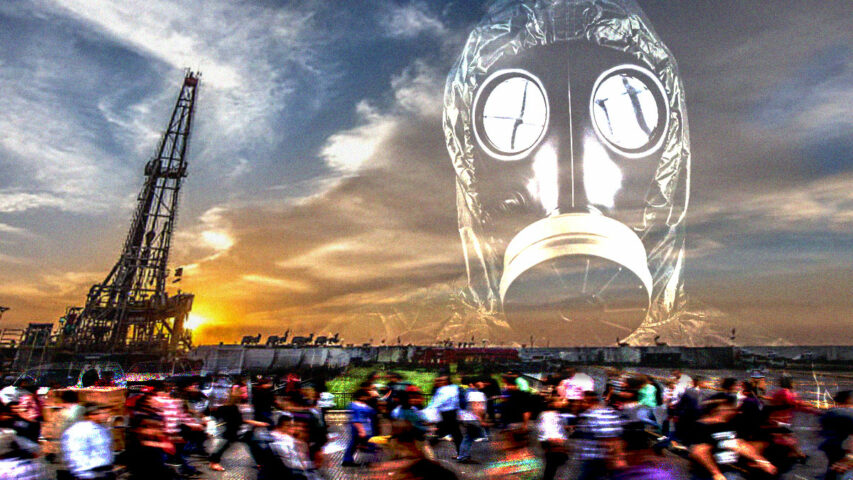- Have any questions? Contact us!
- info@dr-rath-foundation.org

School Age Children More Likely To Be Hit By Lightning Than Die Of Coronavirus
September 30, 2022
Coenzyme Q10 May Reduce Fatigue
October 7, 2022FRACKING: The Scientific Evidence Of Adverse Health Effects That Governments Aren’t Telling You About

Hydraulic fracturing, commonly known as fracking, is a technique for obtaining oil and gas from shale rock. Sometimes referred to as ‘unconventional oil and gas development’, the process involves drilling into the earth and directing a high-pressure mixture of water, sand, and chemicals at rock. While governments commonly claim the process poses little or no risk to public health, the truth is the exact opposite. Studies have demonstrated clear links between fracking and cancer, heart attack, adverse birth outcomes, and numerous other negative health effects.
Undermining their assertions that the process is safe, the fact is that only rarely have governments assembled detailed assessments of the public health risks associated with fracking and weighed these against its supposed benefits. Anyone carrying out such in-depth analyses would find there is much to be concerned about.
Fracking and cancer
Examining the links between fracking and cancer, a review published in the Science of The Total Environment journal in 2017 identified 55 chemicals released into air and water that are known, probable, or possible human carcinogens. These chemicals included 20 that have been shown to increase the risk of leukemia and lymphoma. The researchers warned that millions of people living within a mile of fracking wells may have been exposed to such chemicals.
Recent research has validated these concerns by finding that Pennsylvania children living near unconventional oil and gas developments at birth were two to three times more likely to be diagnosed with leukemia between the ages of 2 and 7 than those who did not live near such oil and gas activity.
Fracking and heart problems
Research published in 2021 shows that unconventional natural gas developments are associated with heart attacks. Published in the journal Environmental Research by researchers in the United States, it found that such developments are associated with increased heart attack hospitalization rates among middle-aged men, older men, and older women, as well as with increased mortality from heart attack among middle-aged men. The researchers say their findings lend support for increased awareness about the cardiovascular risks of unconventional natural gas developments and suggest that bans on fracking can be protective for public health.
Unconventional natural gas development has similarly been linked to hospitalization in patients suffering from heart failure. A study published in the Journal of the American College of Cardiology in 2021 found that older patients with heart failure appear to be particularly vulnerable to adverse health impacts from unconventional natural gas development activity.
Adverse effects on infant health
Multiple studies show that fracking has negative effects on birth outcomes and infant health. A recent study published in the Journal of Health Economics found “consistent and robust evidence” that drilling shale gas wells negatively impacts both drinking water quality and infant health.
Evidence from Pennsylvania confirms the link between fracking and negative effects on infant health. Research published in the Science Advances journal in 2017 found evidence for negative health effects from in utero exposure to fracking sites within 3 km of a mother’s residence, with the largest health impacts seen for in utero exposure within 1 km of sites. The health impacts included a greater incidence of low–birth weight babies as well as significant declines in average birth weight and in several other measures of infant health.
A 2019 study exploring the impact of fracking on infants’ birth health across Oklahoma counties made similar findings, demonstrating that the closer the mother’s residence at birth to fracking wells, the more negative are the effects on the infants’ birth health. The link between proximity to fracking wells and adverse birth outcomes is further supported by separate research from California and rural Alberta, Canada.
Increased hospitalization and other problems
Studies show a clear link between fracking and increased hospitalizations. Research examining the health implications of unconventional natural gas development in Pennsylvania has found a significant association between shale gas development and hospitalizations for pneumonia among the elderly. Evidence from Pennsylvania similarly shows that unconventional natural gas development is associated with hospitalization rates for genitourinary problems such as kidney and urinary tract infections. Other Pennsylvanian research has confirmed a link between unconventional gas and oil drilling and hospital inpatient prevalence rates for the medical categories of dermatology, neurology, oncology, and urology.
Evidence clearly shows that many of the chemicals used in fracking can damage the lungs, liver, kidneys, blood, and brain. Symptoms commonly reported by residents living within 1 km of fracking wells include sleep disruption, headache, throat irritation, stress or anxiety, cough, shortness of breath, sinus problems, fatigue, nausea, and wheezing.
Dancing to the tune of the energy cartel
Given the weight of scientific evidence that now exists, it is impossible to believe that governments are not aware of the adverse health effects of fracking. As such, we can only conclude that public health is knowingly being sacrificed on the twin altars of corporate profit and economic benefit. While currently only four countries (United States, Canada, China, Argentina) produce shale gas or shale oil commercially, others are increasingly attempting to do so. The UK government has recently lifted a ban on fracking that had been in place in the country since 2019, saying it could now go ahead despite opposition from local councils.
Only rarely do politicians focus on the negative health effects of fracking, preferring instead to argue over its environmental impacts. We need to be aware however that dancing to the tune of the energy cartel has a dark and criminal history dating back more than a century and involving two global wars. Politicians and corporations placing profit before human health must be held to account for their actions. Ensuring this happens sooner rather than later may be our best defense against history repeating itself.



